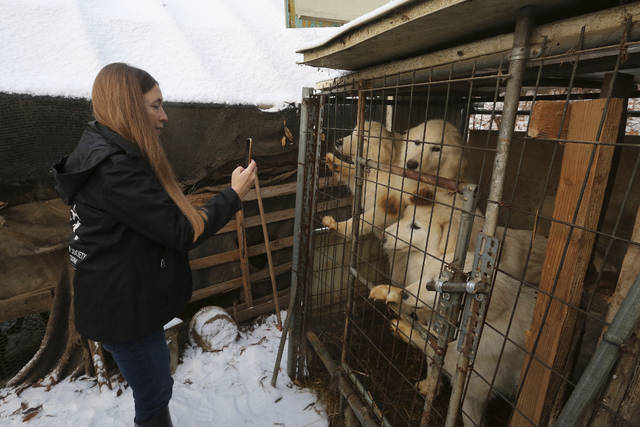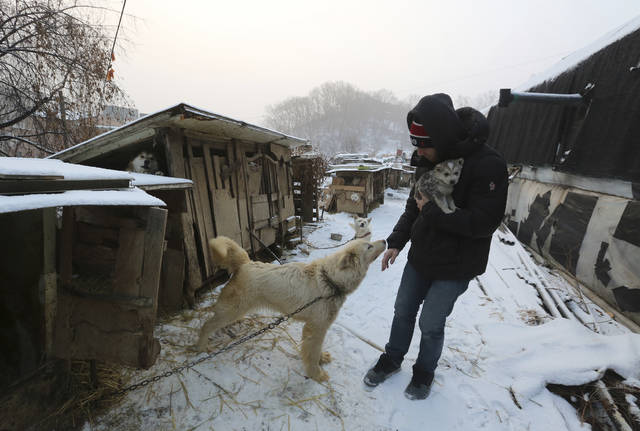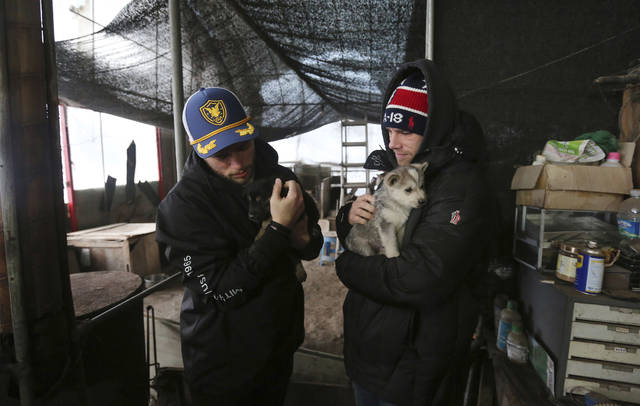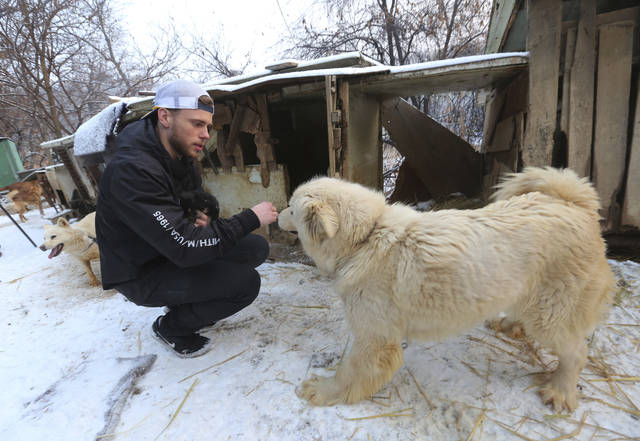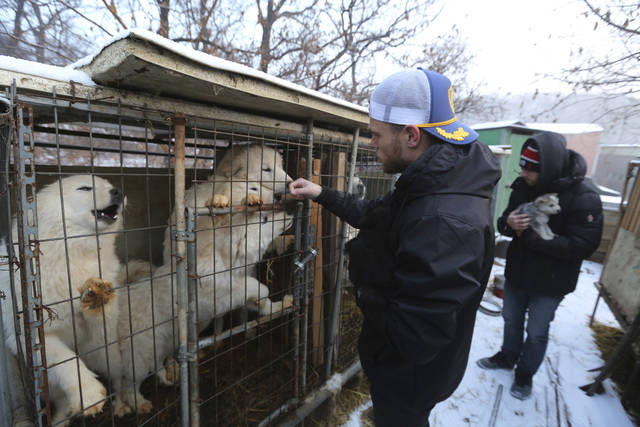SIHEUNG, South Korea — Gus Kenworthy stood stone-faced, a shivering black puppy curled in his arms and more scurrying around him on the dirty, uneven cement floor. A few feet away, the pups’ mother barked and paced, eyeing the 2014 Olympic silver medalist while trying not to trip over the metal chain anchoring her to the wall. Nearly 90 other dogs in and around the cluttered, thin-walled structure also woofed and howled, a cacophony that could be heard from the nearby highway, even over the whoosh of traffic.
“It’s one of the saddest places I’ve ever been,” Kenworthy said.
Four years after rescuing five stray dogs during the Sochi Games, the American freestyle skier visited a dog meat farm in South Korea with boyfriend Matthew Wilkas on Friday. The Associated Press joined them for a tour of the facility, which Humane Society International has begun to shutter.
Kenworthy slowly explored the property in a haze, and Wilkas spent much of the visit nervously chewing on his lip. Neither wants to dictate to Koreans what they should and shouldn’t eat, but they believe strongly that even animals raised for slaughter deserve higher quality of life.
“I’m honestly feeling heartbroken,” Kenworthy said.
The farm is situated less than 100 yards off a busy road, about a 45-minute drive from downtown Seoul. Puppies and their mothers are living inside a narrow planthouse, surrounded by rusty pipes, grimy ceramic pots and old mattresses. Outside, many dogs pulled hard on their chains, creating muddy semicircles in the snow beneath their feet. A dozen or so wood and wire cages held between one and four dogs each. In the back of one crate, a dog was licking a furless newborn puppy that did not appear to be alive.
Nara Kim, HSI’s South Korea dog meat campaigner, has seen worse. The Siheung farmer told HSI he never intended to sell dogs for slaughter but had no choice when his collection of pet Jindo dogs kept producing puppies. He eagerly accepted HSI’s proposal to buy out his farm, and he plans to put those funds into farming mushrooms and other plants.
HSI’s ultimate goal is to pressure the South Korean government into shuttering the industry itself. In the meantime, it’s trying to set an example for how Koreans might do it — by providing resources to farmers who want out.
HSI estimates there are 17,000 dog meat farms around Korea. This farm will be the 11th it has helped close.
There were 87 dogs on the Siheung farm as of Friday morning, though new litters of puppies were expected soon. The dogs will be vaccinated and quarantined on the farm until mid-March. They’ll likely all be flown to North America, where adoption demand is higher than in Korea.
Shelters around Seoul are already overcrowded, Kim said, in part because of the Korean belief that “meat dogs” and “pet dogs” are inherently different.
At least 2 million dogs are slaughtered and eaten each year in Korea. The practice is thousands of years old, though dog meat has waned in popularity and most in the country don’t do it regularly. While many older Koreans believe dog meat aids virility, younger citizens generally are either against the practice or indifferent to it.
In recent years, many South Koreans have been appalled by abuse highlighted in local media reports, increasing pressure on government officials to address the legal trade.
While South Korea offered money to restaurants around Pyeongchang if they took dog meat off their menus, a Gangwon province official told the AP there were no plans to relocate dog farms situated near Olympic areas. There are 17 registered farms located near Olympic venues, but many more closer to Seoul.
Local organizing committee spokesman Sung Baik-you was asked during the Games about the committee’s stance on the sale of dog meat.
“We have not been able to find any places that sells dog meat,” in the Olympics zone, Sung said. “That’s probably a remnant of what’s happened in Korea in the past. Recently in Korea, many families have dogs as pets.”
Still, some Olympians have spoken out against the trade while in Pyeongchang. Most notably, Canadian pairs skater Meagan Duhamel adopted a rescued dog during a competition in Gangneung last year, and she plans to fly more rescued dogs to Canada after the Games.
Kenworthy knew little about the dog meat trade before HSI asked him last year to star in a public-service announcement with other Olympians. After learning more, he was eager to lend his celebrity to the cause. HSI filmed Friday’s visit for use in a second PSA.
“It’s dogs that are worthy of companionship, worthy of being a pet,” Kenworthy said. “All they want is affection and attention, and they’re stuck in tiny metal cages in the snow with nothing to eat.”
Though he didn’t medal, Kenworthy has been among Pyeongchang’s biggest names, in part because of his social media work voicing LGBT pride.
Before he came out as gay in 2015, Kenworthy was best known for saving the strays in Sochi. One of those dogs still lives with his mother, and two more are with his ex-boyfriend.
Kenworthy, born in Britain and raised in Colorado, wants to be careful about dictating principles to another culture. But he feels strongly that if Koreans are going to eat dog, the animals should at least be treated humanely.
“I don’t think it’s fair to come and say, ‘The way that we do something is the right way,’” he said. “But also, I don’t think that cruelty is culture.”
Kenworthy wants to adopt one of the Siheung puppies, but his family is objecting because he and Wilkas — an actor best known for starring in the film “Gayby” — both spend so much time on the road. They have time to decide, with the pups still locked in quarantine.
“If it doesn’t end up with me,” he said, “I’d like to just make sure I know that it has a home where it’s loved and warm and fed and taken care of.”


